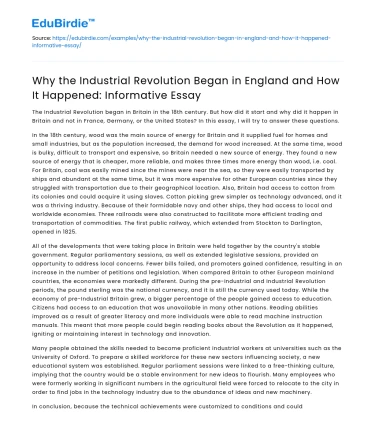The Industrial Revolution began in Britain in the 18th century. But how did it start and why did it happen in Britain and not in France, Germany, or the United States? In this essay, I will try to answer these questions.
In the 18th century, wood was the main source of energy for Britain and it supplied fuel for homes and small industries, but as the population increased, the demand for wood increased. At the same time, wood is bulky, difficult to transport and expensive, so Britain needed a new source of energy. They found a new source of energy that is cheaper, more reliable, and makes three times more energy than wood, i.e. coal. For Britain, coal was easily mined since the mines were near the sea, so they were easily transported by ships and abundant at the same time, but it was more expensive for other European countries since they struggled with transportation due to their geographical location. Also, Britain had access to cotton from its colonies and could acquire it using slaves. Cotton picking grew simpler as technology advanced, and it was a thriving industry. Because of their formidable navy and other ships, they had access to local and worldwide economies. Three railroads were also constructed to facilitate more efficient trading and transportation of commodities. The first public railway, which extended from Stockton to Darlington, opened in 1825.
Save your time!
We can take care of your essay
- Proper editing and formatting
- Free revision, title page, and bibliography
- Flexible prices and money-back guarantee
All of the developments that were taking place in Britain were held together by the country's stable government. Regular parliamentary sessions, as well as extended legislative sessions, provided an opportunity to address local concerns. Fewer bills failed, and promoters gained confidence, resulting in an increase in the number of petitions and legislation. When compared Britain to other European mainland countries, the economies were markedly different. During the pre-Industrial and Industrial Revolution periods, the pound sterling was the national currency, and it is still the currency used today. While the economy of pre-Industrial Britain grew, a bigger percentage of the people gained access to education. Citizens had access to an education that was unavailable in many other nations. Reading abilities improved as a result of greater literacy and more individuals were able to read machine instruction manuals. This meant that more people could begin reading books about the Revolution as it happened, igniting or maintaining interest in technology and innovation.
Many people obtained the skills needed to become proficient industrial workers at universities such as the University of Oxford. To prepare a skilled workforce for these new sectors influencing society, a new educational system was established. Regular parliament sessions were linked to a free-thinking culture, implying that the country would be a stable environment for new ideas to flourish. Many employees who were formerly working in significant numbers in the agricultural field were forced to relocate to the city in order to find jobs in the technology industry due to the abundance of ideas and new machinery.
In conclusion, because the technical achievements were customized to conditions and could not be successfully deployed abroad, the Industrial Revolution was restricted to Britain for many years. Engineers worked to increase efficiency by reducing the utilization of both inexpensive and expensive inputs. Technical talent squandered the country's technological lead by developing 'suitable technology' for the rest of the world. Advanced technology could be economically employed in nations like France, which had pricey energy, and India, which had inexpensive labor, by the middle of the nineteenth century. After that, the Industrial Revolution spread throughout the world.






 Stuck on your essay?
Stuck on your essay?

